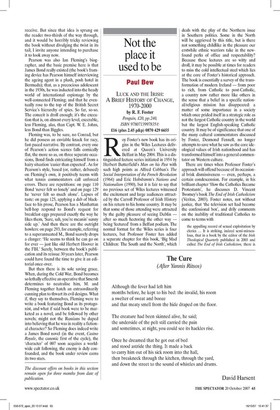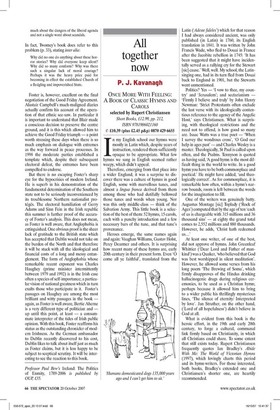Not the place it used to be
Paul Bew LUCK AND THE IRISH: A BRIEF HISTORY OF CHANGE, 1970-2000 by R. F. Foster Penguin, £20, pp.240. ISBN 9780713997835© £16 (plus 2.45 p&p) 0870 429 6655 Roy Foster's new book has its origins in the Wiles Lectures delivered at Queen's University Belfast in May 2004. This is a distinguished lecture series initiated in 1954 by Herbert Butterfield's Man on his Past with such high points as Alfred Cobban's The Social Interpretation of the French Revolution (1964) and Eric Hobsbawm's Nations and Nationalism (1990), but it is fair to say that no previous set of Wiles lectures witnessed the excitement and large audiences attracted by the Carroll Professor of Irish History on his return to his home country. It may be that some of those attending were attracted by the guilty pleasure of seeing Dublin — after so much hectoring the other way — being 'lectured' from a Belfast podium. The normal format for the Wiles series is four lectures, but Professor Foster has added a separate chapter for this book, 'Big Mad Children: The South and the North', which deals with the play of the Northern issue in Southern politics. Some in the North will be aggrieved by this title, but is there not something childlike in the pleasure our erstwhile ethnic warriors take in the newfound perks of office and respectability? Because these lectures are so witty and droll, it may be possible at times for readers to miss the cold intellectual steel which lies at the core of Foster's historical approach. The book is essentially a survey of the transformation of modern Ireland — from poor to rich, from Catholic to post-Catholic, a country now rather more like others in the sense that a belief in a specific national/religious mission has disappeared: a matter of some importance in a society which once prided itself in a strategic role as not the largest Catholic country in the world but the largest English-speaking Catholic country. It may be of significance that one of the many cultural commentators discussed by Foster, Desmond Fennell, no longer attempts to save what he saw as the core ideological values of Irish nationhood and has transformed himself into a general commentator on Western culture.
There are times when Professor Foster's approach will offend because of its occasional brisk dismissiveness — even, perhaps, a certain condescension. For example, in his brilliant chapter 'How the Catholics Became Protestants', he discusses D. Vincent Twomey's book The End of Irish Catholicism (Veritas, 2003). Foster notes, not without justice, that `the television set had become the confessional box', and drily comments on the inability of traditional Catholics to come to terms with the appalling record of sexual exploitation by clerics ... It is striking, indeed semi-miraculous, that in a book by the editor of the Irish Theological Quarterly published in 2003 and called The End of Irish Catholicism, there is much about the dangers of the liberal agenda and not a single word about scandals.
In fact, Twomey's book does refer to this problem (p. 33), stating inter alia: Why did no one do anything about these horror stories? Why did everyone keep silent? Why did so many conform? Why was there such a singular lack of moral courage? Perhaps it was the heavy price paid for becoming in effect the established Church of a fledgling and impoverished State.
Foster is, however, excellent on the final negotiation of the Good Friday Agreement. Alastair Campbell's much-maligned diaries actually confirm his account of the operation of that ethnic see-saw. In particular it is important to understand that Blair made a conscious decision to preserve the centre ground, and it is this which allowed him to achieve the Good Friday triumph — a point worth stressing these days when there is so much emphasis on dialogue with extremes as the way forward in peace processes. In 1998 the moderate parties established a template which, despite their subsequent electoral defeat, the extremes have been compelled to endorse.
But there is no escaping Foster's sharp eye for the hypocrisies of modern Ireland. He is superb in his demonstration of the fundamental determination of the Southern state not to be seriously inconvenienced by its troublesome Northern nationalist protégés. The electoral humiliation of Gerry Adams and Sinn Fein in the Irish republic this summer is further proof of the accuracy of Foster's analysis. This does not mean, as Foster is well aware, that Anglophobia is extinguished. One obvious proof is the sheer lack of gratitude to the British state which has accepted that Dublin would not take on the burden of the North and that therefore it will be stuck with all the ideological and financial costs of a long and messy entanglement. The form of Anglophobia whose remarkable recent exponent was Charles Haughey (prime minister intermittently between 1979 and 1992) is in the Irish case often a species of self-importance; a particular vision of national greatness which in turn exalts those who participate in it. Foster's passages on Haughey are among the most brilliant and witty passages in the book — again, as Foster is well aware, Bertie Aherne is a very different type of politician and — up until this point, at least — a consummate interpreter of the tides of Irish public opinion. With this book, Foster reaffirms his status as the outstanding chronicler of modern Irishness. As the German ambassador to Dublin recently discovered to his cost, Dublin likes to talk about itself just as much as Foster claims, but it is less happy to be subject to sceptical scrutiny. It will be interesting to see the reaction to this book.
Professor Paul Bew's Ireland: The Politics of Enmity, 1789-2006 is published by OUB £35.








































































 Previous page
Previous page